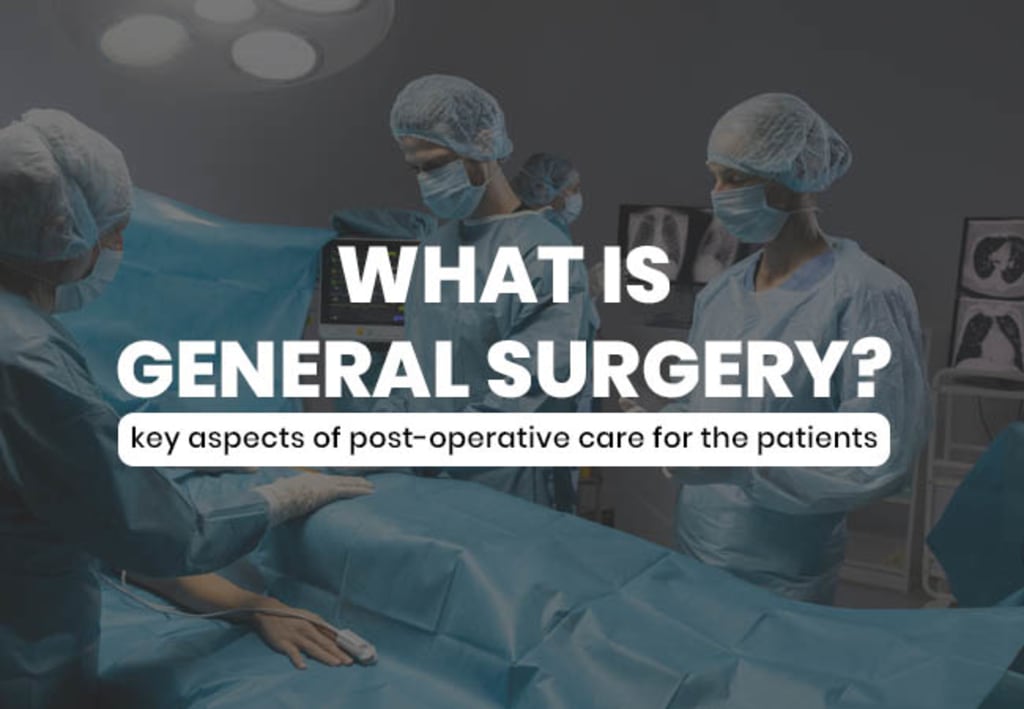What is General Surgery?
key aspects of post-operative care for the patients

General surgery is a medical discipline that majorly focuses on performing surgical procedures to treat a wide range of diseases, injuries, and conditions. General surgeons are trained to operate on various parts of the body, including the abdomen, digestive tract, endocrine system, skin, and soft tissues, and more. They have an extensive knowledge and skills to deal with different kind of surgical emergencies and are specialized in performing acute abdominal problems. In addition to surgical procedures, general surgeons may also be involved in the pre-operative and postoperative care of patients. This can include diagnosing medical conditions, discussing treatment options, performing examinations, prescribing medications, and providing follow-up care.
What types of procedures does General Surgery include?
General surgeons may specialize in one or more areas within the field, such as colorectal surgery, breast surgery, or endocrine surgery, focusing on surgeries related to those specific regions or organs. They possess the expertise to perform a diverse array of procedures as part of their job. General surgery encompasses a wide range of procedures involving the surgical treatment of various medical conditions. The following are some common procedures carried out by general surgeons:
1. Minimally invasive surgeries: General surgeons often utilize minimally invasive techniques, such as laparoscopy or robotic-assisted surgery, to perform procedures with smaller incisions and faster recovery times. This can include procedures like laparoscopic cholecystectomy (gallbladder removal), laparoscopic appendectomy, or laparoscopic hernia repair.
2. Emergency surgeries: They are involved in emergency cases, such as trauma surgery for injuries resulting from accidents or emergencies, including appendicitis, bowel obstructions, or perforations.
3. Gastrointestinal surgeries: Procedures involving the gastrointestinal tract, such as colectomy (removal of part or all the colon), small bowel resection, gastric bypass surgery for weight loss, or surgeries to treat conditions like diverticulitis or inflammatory bowel disease are performed by general surgeons.
4. Endocrine surgeries: Surgeries related to endocrine glands, including thyroidectomy (removal of the thyroid gland), parathyroidectomy (removal of the parathyroid glands), or adrenal gland surgery are executed by general surgeons.
5. Breast surgeries: General surgeons take part in breast surgeries, such as lumpectomy (removal of a breast lump), mastectomy (removal of the breast), or breast reconstruction after mastectomy.
6. Vascular surgeries: Vascular procedures, including the surgical treatment of conditions such as varicose veins, arterial blockages, or aneurysms are conducted by general suregeons.
7. Colorectal surgeries: General surgeons perform surgeries involving the colon, rectum, and anus, including procedures like hemorrhoidectomy (removal of hemorrhoids), colon resection for cancer, or treatment of conditions like inflammatory bowel disease.
8. Hernia repairs: Hernia repair surgeries, such as inguinal hernia repair, umbilical hernia repair, or hiatal hernia repair are also a part of general surgeon’s list of surgical procedures.
9. Skin and soft tissue surgeries: This procedure include Excision of skin lesions, removal of cysts or lipomas, or skin grafting procedures.
10. Pediatric surgeries: General surgeons may also be involved in pediatric surgeries, including procedures such as appendectomy, hernia repair, or the correction of congenital abnormalities.
These are just a few examples of the types of procedures performed by general surgeons. General surgery is a broad specialty that covers a wide range of surgical interventions for various medical conditions.
key aspects of post-operative care for the patients
Recognizing the importance of post-operative care after a surgery is of utmost importance to ensure proper healing, prevent complications, and promote the patient's overall recovery. Here are some important aspects of post-operative care:
• Regular monitoring of vital signs is crucial for detecting any complications or changes in the patient's condition.
• Adequate pain management, including medication and non-pharmacological approaches, ensures patient comfort and aids in recovery.
• Proper wound care, such as cleaning the incision site and changing dressings, promotes healing and prevents infection.
• Surgical drains may be used to remove excess fluid or blood, and their proper management is necessary.
• Early mobilization and ambulation help prevent complications like blood clots and respiratory issues.
• Deep breathing and coughing exercises prevent respiratory complications and improve lung function.
• Following the prescribed medication regimen and reporting concerns or side effects to the healthcare team is important.
• Nutritional support, through dietary guidelines or supplements, aids in wound healing and recovery.
• Regular follow-up appointments with the surgeon monitor healing progress and address concerns or complications.
• Comprehensive education about post-operative care and discharge planning ensures a smooth transition to home or rehabilitation facility, if needed.
The above mentioned provide general instructions for post-operative care. However, specific instructions may vary based on factors such as the type of surgery, the patient's condition, and the surgeon's recommendations. Consequently, the healthcare team at the best hospital in Lucknow will offer personalized instructions and support based on the patient's needs.
About the Creator
krishna hospital
If you're seeking exceptional healthcare services and contemporary amenities, consider visiting the finest hospital in Lucknow. Place your trust in us for skilled medical treatment and the preservation of your well-being.






Comments
There are no comments for this story
Be the first to respond and start the conversation.